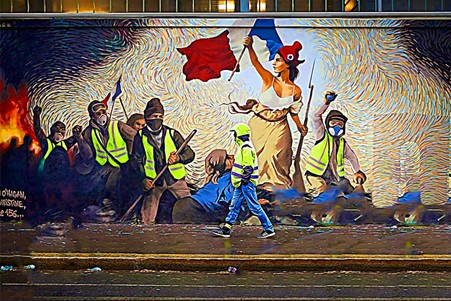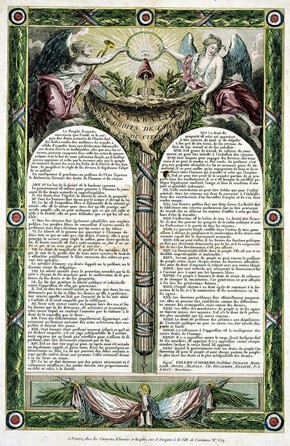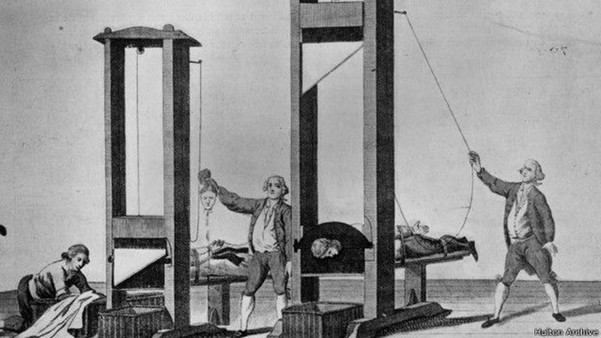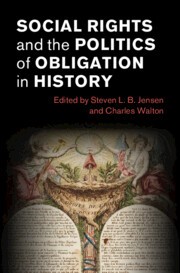What the French Revolution Reveals about Modern Struggles over Social Rights
published on 29 Nov 2021 - Charles Walton

Figure 1. Open Global Rights (July 9, 2021)
In recent decades, it has become common for human-rights scholars to refer to social rights – such as those to work, welfare, education and healthcare – as ‘second generation rights’, as twentieth-century ‘socialist’ additions to the ‘liberal’ corpus of civil and political rights bequeathed by Age of Democratic Revolutions of the eighteenth century. This ‘generational’ framing of rights development emerged in the 1970s as a kind of shorthand for categorising various human rights, but it soon took on a life of its own, insinuating itself into historical thinking. It is, however, deeply problematic. Not only does it distort the true origins of social rights. It also obscures a longer and more interesting history, one that pre-dates socialism.
Like civil and political rights, social rights, as constitutional provisions, stretch back to the late eighteenth century. As legal provisions, they stretch back even further. In medieval and early modern Europe, poverty was considered a legal condition entitling the poor to assistance. In Elizabethan England, such entitlements became statutory commitments. Despite this tradition, social rights did not work their way into Anglo-American constitutions: neither the English Bill of Rights of 1689, promulgated in the wake of the Glorious Revolution, nor the American Bill of Rights of 1791, following the American Revolution, acknowledged social rights.
French revolutionaries, however, did acknowledge them, albeit in stages. The rights to work, welfare and education were not included in the Declaration of the Rights of Man and of the Citizen of 1789 but were included in the revised declaration of 1793, promulgated during the revolution’s Jacobin phase. Yet, even in 1789, calls for social rights were made. Support for them spanned the political spectrum, from future Jacobins to future counterrevolutionaries and even to ardent ‘free-marketeers’ – the group we would think least favourable to them.

Figure 2. The Declaration of the Rights of Man and of the Citizen (1793). Archives nationales de France, AE/II/3701

Figure 3. Articles 21 and 22 of the 1793 Declaration of the Rights of Man and of the Citizen
Take, for example, the views of the national deputy Pierre-Samuel Dupont de Nemours. A prolific political economist and ministerial aid under Louis XVI in the 1780s, Dupont drafted a model rights declaration in the spring of 1789. It asserted that ‘all men have the right to assistance from other men’ and that society ‘has a sacred debt’ to provide jobs for the able bodied and subsistence for those unable to work, due to age or infirmity. Yet, he also argued that government should spend as little as possible and let capital and labour drive the economy – ‘laisser faire le peuple’, as he put it.
To understand why a free-marketeer would support social rights, we must put aside anachronistic notions of socialism and the welfare state. For Dupont, social rights did not depend on state intervention. He believed that once society was properly ‘enlightened’ and markets were freed, civil society would morally and economically regulate itself. Prosperity and solidarity would follow.
Dupont and other supporters of social rights in 1789 failed to convince the National Assembly to recognise them. Dupont’s free-market vision of society, however, was widely shared, and it shaped the economic policies of the early revolution – with disastrous results. The more the economy was liberalised, the more unstable the political situation became. After the constitutional monarchy was toppled and a republic was declared in August 1792, revolutionaries had to draft a new constitution. Calls to include social rights came from all parts – from radical sans-culottes, who also clamoured for price controls and property redistribution, to well-heeled moderates, who still believed that market freedom would resolve the problem of food shortages.
While consensus reigned on including social rights in the Constitution of 1793, differences emerged on financing them. The new rights declaration made ‘society’ the duty-bearer of these rights but without defining what ‘society’ meant. Did it refer to civil society, and thus to the voluntary mechanisms of markets and charity, as in 1789? Or did it now encompass a fiscal redistributive state, the arm of society’s political will?
Lacking clarity on this issue, local officials took matters into their own hands -- chaotically. Facing food shortages and insurrections, they fundraised, taxed and extorted to pay for social aid, depending on their predilections and the gravity of the local situation. Their inconsistent approaches and occasional lapses into coercion prompted accusations of arbitrariness. As prisons were filled and guillotines were erected (largely for other reasons), critics of the new regime began associating social rights with Jacobin terror – as if the former necessarily produced the latter.
Arguably, though, the problem was not social rights per se. Rather, it was the inability to agree on the moral and economic obligations that would ensure their financing. The Revolution had disrupted old hierarchical patterns of obligations. New ones had to be created for a new world of freedom and equality. Early revolutionaries, such as Dupont, had imagined these obligations being fulfilled voluntarily through free markets and charity. When that proved to be insufficient, officials began adopting more compulsory measures, converting charity (‘patriotic gifts’) into ‘revolutionary taxes’. To those forced to pay it, these measures violated the property rights. Contention became so intense that, by 1795, revolutionaries scrapped the 1793 constitution and wrote another one – the revolution’s third – this time, without including social rights.

Figure 4. French Revolution Execution with Guillotine. Hulton Archive – Public Domaine
Struggles over social rights persisted over the next two centuries. Despite their re-emergence in constitutions and international law in the twentieth century – Mexico (1917), Weimar Germany (1919), Ireland (1922, 1937), USSR (1936), the United Nations’ Universal Declaration of Human Rights (1948) – critics continued associating them with violence. In On Revolution (1963), Hannah Arendt concluded that Jacobin efforts to resolve the ‘social question’ (misery) through social rights – ‘the rights of the sans-culottes’ – tragically sent the Revolution spiraling into the Terror. Her pessimism was shared by others during and after the Cold War. It was echoed by first director of Human Rights Watch, Aryeh Neier, who justified his controversial refusal to monitor social rights by arguing that ‘authoritarian power is probably a prerequisite for giving meaning to economic and social rights.’
These views were not new. They date from the period of the French Revolution itself. But the notion that social rights lead to violent and oppressive regimes, in addition to being wrong, obscures what is really at stake in struggles over social rights: how to define societal duties and obligations in ways that are consistent with freedom and equality. Social rights traversed the late medieval and early modern eras, when hierarchy prevailed; they stumbled through the modern age of civil equality. The question is why? Rather than dismiss social rights as inherently illiberal and dangerous, we might do better to understand their history and how they have been entangled in struggles over the social contract – over determining what individuals owe one another and the role the state should play in managing those obligations. As some French revolutionaries realised by 1793, markets and charity may not be enough.

Charles Walton is a reader in History at the University of Warwick. He is PI for the Leverhulme International Network on Social Rights and co-editor with Steven L. B. Jensen of Social Rights and the Politics of Obligation in History (Cambridge, 2022).
